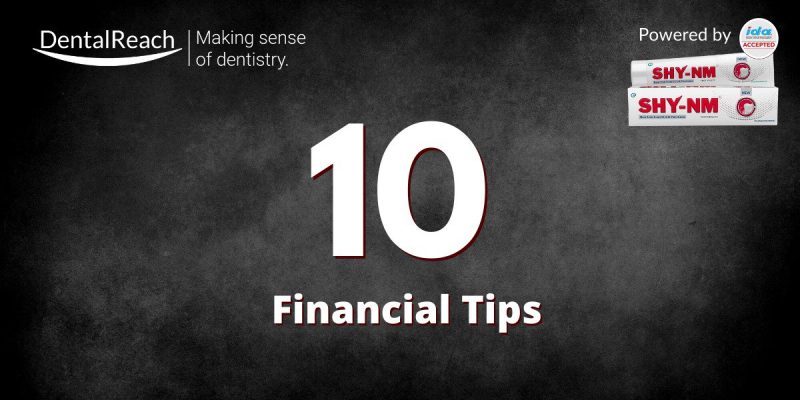Abstract
Managing money doesn’t seem lucrative but spending it is tempting which inadvertently leads to poor financial choices. You maybe just starting out with a clinic, but when your friends drag you out for a scrumptious meal on the weekend or that one latest tech gadget you had your eyes on hits the market, young earners who have lived their college life miserly may make some poor decisions by drowning mentally in the philosophy of, ‘Kal Ho Naa Ho’! Youngsters these days are fond of gymming and physical fitness but financial fitness is equally important, especially when you have to manage your own setup.

Financial fitness – a must when you are a fresher dentist
Knowing that you have enough money to pay for what you want today and in the future is one way to feel financially fit. It is the guiding force towards saving, investing and insuring ourselves.
Unfortunately for learning the above, a subject titled ‘Financial Literacy for Young Adults’ was missing in our college curriculum which left most of us clueless about how to manage our money or understanding how and why not to apply for loans or if applied, how to manage them. These knowledge gaps continue forward in professional life till late middle age and by then, when we understand the same, a lot of water has already passed under the bridge.
Being financially independent is a wonderful place to be in. It is empowering to make your own decisions, especially regarding money. On the flipside, instilling the habit of financial planning in young adults is a tough job. The sooner we start learning to manage our money, the better our chances of financial success . The perennial problem with youngsters is that when they start to think about their finances, they don’t know where and how to begin. Let me give fresher dentists 10 golden nuggets- tips that they MUST follow to manage and plan their finances well:
1. Track your spends
The first thing to do is start today by noting down how much you spend on everything for a week. Your petrol/cab/travel expenses, lunch (if binging outside), grocery, eating out with friends, practically just about everything. Use an on the go app like a Khatabook on your phone to make tracking easier. After a week, sit down and take a good look at what you have been spending on. The science behind tracking your expenses is for you to become more conscious, have clarity and self-awareness of your spending habits, monitor your expenses and stick to your thought of budget.
2. Set some goals
Money has multiple uses, so set goals not only for your needs but wants, gratification and spoiling your loved ones. Your goals and dreams are a big key to making your financial journey worthwhile because only you can define the meaning of being financially viable and what money actually means to you. Plan for your vacation (which needn’t be international but local) and start by picking out a destination, a date along with the amount needed and start working towards achieving that specific amount for that well-deserved vacation after months of hard work.
3. Start building an emergency fund
A typical emergency fund means 6 months of your living expenses along with 6 months of your clinic’s fixed expenses. You may not be having your own clinic at the start of your career. So, this fund can be altered for you to suit your needs depending on your lifestyle, monthly expenses and income. Don’t pressure yourself into achieving that amount in the least time possible, instead slowly yet surely work your way towards it. Think of an emergency fund as a shock absorber for when the unexpected happens like a job lay-off or stepping down from job yourself to prepare for entrance exams etc. This fund not only saves you money, but is an important component of your long-term financial goals and more importantly, sets the tone for a financial discipline in your life.
4. Save first, spend later
This may seem overwhelming to you in the beginning with your limited income, but it is one of the vital steps towards financial freedom and security. Saving leads to investing further. In finance, your biggest asset is your time. The longer you give your money time to grow , the more massively it will start growing when compounding starts. A minimum amount for a mutual fund SIP can be as good as Rs. 2000 per month. Make learning finance as a personal goal, that you have to learn as much about investing as you start investing but a word of caution here; don’t keep on waiting for eternity for the same and don’t delay your start. Start small and slowly work your way up to bigger investments as you grow in age, stature, practice and income.
5. Deal with surplus cash judiciously
If you have a side hustle other than your dentistry sojourn, make sure to treat this extra stream of income in an empowering way and use it for saving/investing/splurging. It can also help you to alleviate some financial stresses and pay off loans faster, if any. Practically, how you deal with surplus cash determines your future. Without any concrete plan for budgeting, you are likely to overspend and make yourself financially insufficient.
6. Investment is a mandatory exercise
In the backdrop of inflation, everything is going to be costlier with each passing year. If you can invest the surplus money, your money can grow to bridge the inflation gap. Investing can be a great way to channelize the extra cash and counter inflation. It can be used to grow wealth and divert it to goal accomplishment. The earlier you start investing, the better it is. Investing can be a bridge between where you are and where you want to be.
7. Avoid debt (any form) but if unavoidable, learn to manage it better
Taking loans always seems an easy leeway to achieve your life goals but they do come with a fair share of flaws. The high interests start eating into your savings and when taking multiple loans, it does affect your credit score also, thereby making it harder for you to avail credit when absolutely necessary. One may also end up borrowing fresh loans to pay off older loans. If it spirals out of control, then you may fall in a vicious debt trap. Your critical life goals may get side-lined; thus, it makes sense to strategize your debt payment which may keep you away from such troubles. Try to limit your debt as much as possible, although having none is a great option.
Credit cards are also debts!
Credit card is one of the worst and most expensive forms of debt. Being dependent on credit cards can hamper your budget and become a financial burden. As soon as your salary gets credited each month, pay off your credit card balance in full. Don’t fall for the lure of paying off the minimum balance. Even before you know, the interest will spiral up to eat out all your savings. Make it a point to use the credit card only in case of emergency. Always keep this kind of debt as the last resort. As far as possible, make down payments for your purchases.
8. Get a Term Plan (Insurance)
Get a term insurance plan of minimum 1 crore which safeguards your family in case of any eventuality that happens to you. You need a disability rider in the same plan of the same value. These need to be purely like a vehicle insurance where you don’t get anything back just like if your vehicle doesn’t get hit the whole year, but the coverage still remains optimum in case of any accident or so.
9. Get a Medical Insurance (Health)
Medical treatments are costly and calamities don’t strike with invitation. COVID-19 pandemic has made the entire world sit up and realise that medical exigencies are unpredictable and can cause a financial upheaval that is tough to handle. With high infections around us and inflation acting as a deterrent to aid anyways in the rising cost of medical expenses; access to good medical facility and hospitalisation costs can be financially strenuous. Therefore, getting a health insurance cover can provide the added protection you need. It is easier than you think to end up in a road accident and fall down a flight of stairs. If you are uninsured, don’t wait another day to apply for health insurance. Get a minimum Rs. 5 lac coverage base plan with top-up/super-top-up of 10 lac-15 lac depending on your family history of diseases.
10. Educate yourself on personal finance
If you don’t learn to manage your money, then other people will find ways to mismanage it for you. Some of these people may have bad intentions, like unscrupulous financial planners. Some of the others may be well-meaning, but not fully informed about your circumstances and make random and blanket recommendations. So, instead of relying on generalized advice from unqualified people, take charge of your own financial future and get literate on personal finance. Once you are armed with financial knowledge, don’t let anyone get you off track whether it is someone who siphons off money from your bank account or friends who want you to go out and blow tons of money with them every weekend.
Conclusion
For most of us, we didn’t have any money education until we started working. Financial planning is the process, which provides you a framework for achieving your life goals in a systematic and planned way by avoiding shocks and surprises. Getting thrown into the big bad world filled with bills, drills and bills of drills, we wished that there was some guiding force in our college itself that can help us navigate our finances so that we didn’t have to find out in the hard way. Personal finance tips are never from any rule book. If you are just starting out, these 10 steps can protect your financial health. Managing your money isn’t always a fun activity, however, there are plenty of ways you can manage your money wisely, while still enjoying life’s simple pleasures.
The list above is to make for easier reading and set a road-map for you to follow and with experience you will learn how to manage money smartly. Start moving towards financial security for yourself with these 10 simple money management tips!
References
1. https://www.iciciprulife.com/investments/money-management-tips.html
2. https://www.investopedia.com/articles/younginvestors/08/eight-tips.asp
3. https://cleartax.in/s/beginners-financial-planning
4. https://www.manulife.ca/personal/plan-and-learn/healthy-finances/financial-planning/ten-simple-money-management-tips.html
5. https://www.thebalancemoney.com/top-ten-financial-tips-1289309
6. https://www.fullertonindia.com/knowledge-center/financial-planning-rules-for-beginners.aspx
7. https://www.forbes.com/sites/forbesfinancecouncil/2020/04/22/15-financial-planning-tips-for-beginners/?sh=6c321ab91bde
8. https://bigpayme.com/blog/10-financial-tips-for-beginners/
9. https://mint.intuit.com/blog/planning/money-101-27-financial-tips-to-live-by/#entry-content
10. https://economictimes.indiatimes.com/wealth/plan/10-money-tips-for-young-earners/articleshow/95307845.cms
















Comments